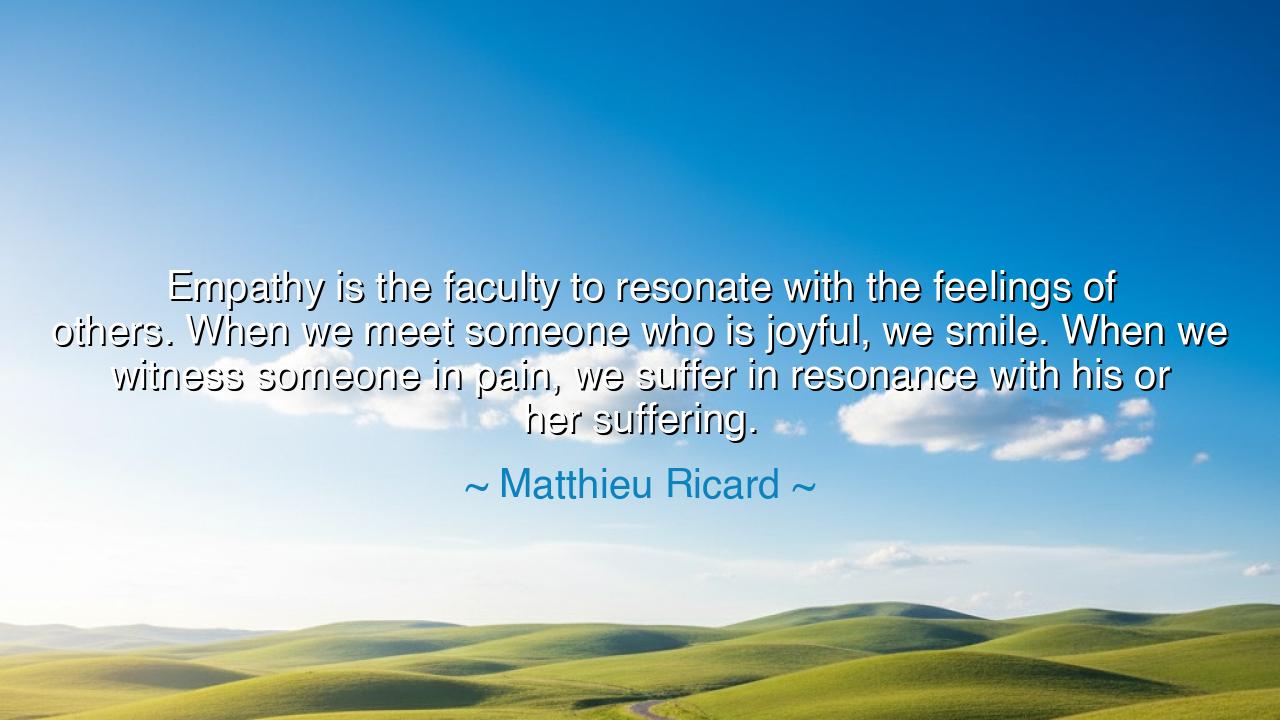
Empathy is the faculty to resonate with the feelings of others.
Empathy is the faculty to resonate with the feelings of others. When we meet someone who is joyful, we smile. When we witness someone in pain, we suffer in resonance with his or her suffering.






Hear now the words of Matthieu Ricard, the monk who has devoted his life to compassion: “Empathy is the faculty to resonate with the feelings of others. When we meet someone who is joyful, we smile. When we witness someone in pain, we suffer in resonance with his or her suffering.” These words flow like water from an ancient spring, reminding us of a truth older than nations and kingdoms—that the heart is not made to beat alone. Empathy is the golden bridge between souls, a bond invisible yet stronger than chains of iron, carrying joy and sorrow alike across the abyss that separates “I” from “Thou.”
The ancients would have called it a divine echo: the spirit of one person vibrating in harmony with another. It is the resonance of life, the sacred trembling when one soul touches another’s flame. When joy shines upon the face of a friend, it kindles joy within us; when grief darkens the eyes of a stranger, a shadow crosses our own hearts. To possess this faculty is to live not as a stone, untouched by wind and rain, but as a living tree whose branches sway with the storm, whose blossoms open to the sun.
Consider the story of the great physician Hippocrates, the father of healing in ancient Greece. He did not see the sick as mere vessels of disease, but as brothers and sisters in need. He taught that to heal, one must first feel. It is said he would sit beside the suffering, listening to their fears, entering into their sorrow, before offering herbs or incantations. His medicine worked not only because of knowledge, but because of empathy—because the patient felt seen, heard, and comforted. Thus Hippocrates shows us that empathy is not weakness, but a force that can mend both flesh and spirit.
Nor is history lacking in mightier examples. In the heart of India, when the Buddha walked among his disciples, he declared that to understand suffering is the beginning of wisdom. Once, upon seeing a grieving mother holding her dead child, he did not speak cold doctrine; he shared her pain, wept with her, and then taught her gently the truth of impermanence. His greatness was not only in his enlightenment, but in his compassionate resonance—he allowed another’s suffering to touch him, and from that touch gave healing.
What lesson does Ricard give us in this age of noise and indifference? It is this: to be human is not to live sealed within our own shell. The measure of our humanity is the degree to which another’s cry awakens us, another’s laughter lifts us. To harden the heart is to betray our own nature. To open it is to discover strength deeper than self-preservation, a strength that unites instead of divides.
Let us then not despise empathy as weakness, for it is a form of courage. It takes courage to suffer with another, to enter into their darkness, to risk one’s own comfort for their sake. And it takes humility to rejoice in another’s joy without envy, to smile simply because another smiles. The heroes of the spirit are not those who stand apart, but those who walk alongside, feeling the world’s burdens as their own.
Practically, how do we cultivate this? Begin with attention. When you meet someone, do not rush past their words—listen with your whole being. Look upon their face, see their eyes, and let their feelings echo in you. Practice small acts of kindness: a smile to the joyful, a hand to the weary, a silence to the grieving. In daily life, allow yourself to be moved, for movement of the heart is the proof of life itself.
Thus, Ricard’s teaching is no gentle suggestion but a call to live nobly. Empathy is not merely a feeling—it is the very thread that weaves humanity into one fabric. Without it, we are scattered stones; with it, we are a temple, built of countless hearts, beating together. Let us therefore carry this wisdom into every encounter, that we may leave behind us a trail not of indifference, but of compassion, stronger than time.






AAdministratorAdministrator
Welcome, honored guests. Please leave a comment, we will respond soon